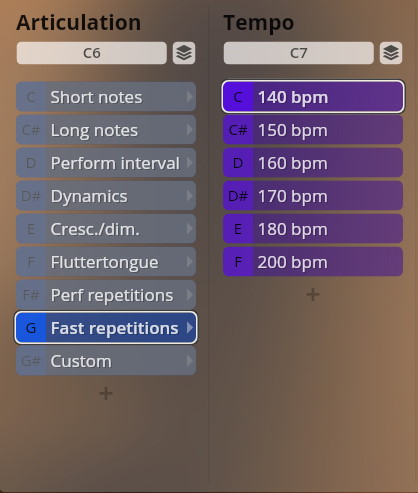previously "SYNCHRON-ized Dimension Brass I & II"
Studio Dimension Brass takes our renowned Vienna Instruments Collections Dimension Brass I and Dimension Brass II to the Synchron Stage. The two Collections were optimized for our Vienna Synchron Player, and perfectly balanced to interact with other Synchron instruments.
The Presets of each instrument group are subdivided into 9 different Articulation categories (plus a ninth named "Custom", ready for your own creations):
- Short notes
- Long notes
- Performance intervals
- Dynamics
- Cres/dim strong
- Cres/dim light
- Flutter tonguing
- Performance repetitions
- Fast repetitions
Within these Articulation categories, you can select a Type (if applicable), e.g., normal or fast legato. For some of the types there are additional options available, such as sustained notes with added marcato attack.
Patches can be used to build your own custom Presets and adapt the Synchron Libraries to your specific requirements.
For designating pitch, the Vienna Symphonic Library uses International Pitch Notation (IPN), which was agreed upon internationally under the auspices of the Acoustical Society of America. In this system the international standard of A=440 Hz is called A4 and middle C is C4. All pitches are written as capital letters, their respective octave being indicated by a number next to it. The lowest C on the piano is C1 (the A below that is A0), etc.
The Synchron Player software allows you to set middle C to C3, C4, or C5 according to your preference. Selecting another setting than C4 will of course also change the play ranges and keyswitches accordingly.
Presets comprise all recorded Patches of an instrument group in Articulation groups, which again contain Types of the respective Articulation, with further options if available. The general structure is the same for every instrument, making it easy to switch or combine instruments without major adaptations.
Articulations are disabled by default. Enabling an Articulation means that all the Types contained will be activated, too, so if you happen to be short of RAM it is advisable only to activate what you really need (you can always add more Types later).
By default the keyswitches for Articulations are mapped from C1 to A1 (for Middle C = C4) for the trumpets, and C6 to A6 for all other instruments. For the available Types, the keyswitches start at C2 for trumpets, and at C7 for all others.
Additional options within Articulations or Types are offered by the Dimension Controllers. The controller function is indicated by the respective caption, as of course it may take on different tasks as needed. In this Collection, the only Dimension Controllers are MIDI CC1 for the long notes' marcato option, and keyswitches for the crescendo and diminuendo Patches.
Apart from the individual instruments (e.g., Trumpet 1-4), there are also Presets featuring groups of comprising two and four players. These allow you to address more than one instrument at the same time, while keeping the individual players' slight differences in playing. The keyswitches for player groups go from F6 to B6 for the trumpets, and from F5 to B5 for all other instruments.
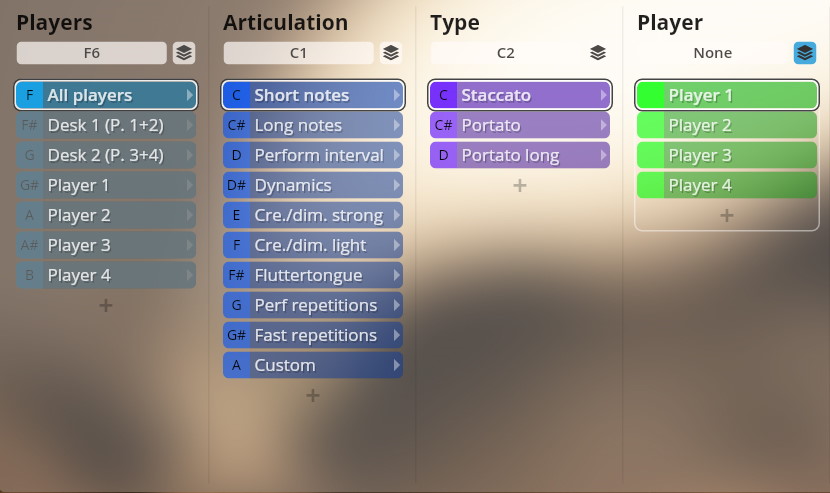
Staccato, portato, and long portato. There are no further options to these articulation types.
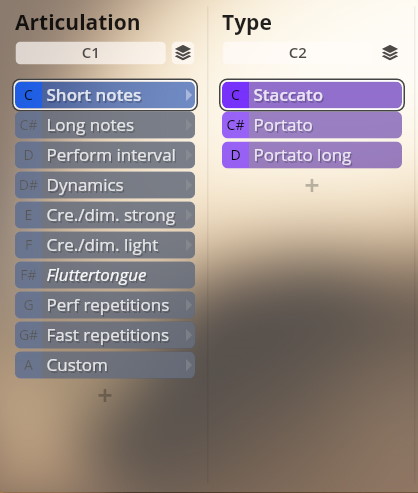
Sustained notes, normal, "blared", marcato, and medium piano and forte. The latter are unlooped medium sustains with a dynamic range from pp-mf and mf-ff, respectively.
- Normal
- Blare
- Sus medium p
- Sus medium f
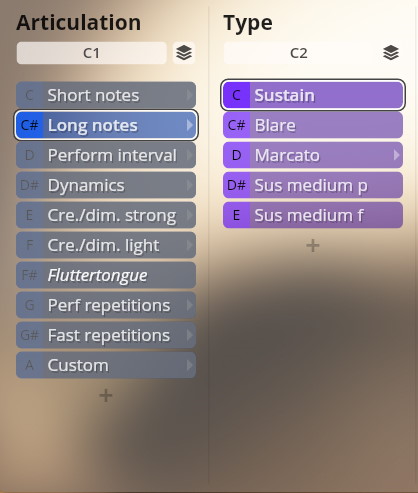
Marcato
As above with normal sustains, but with the option to use Dim.Ctrl/A (CC1) to add marcato attacks to the notes.
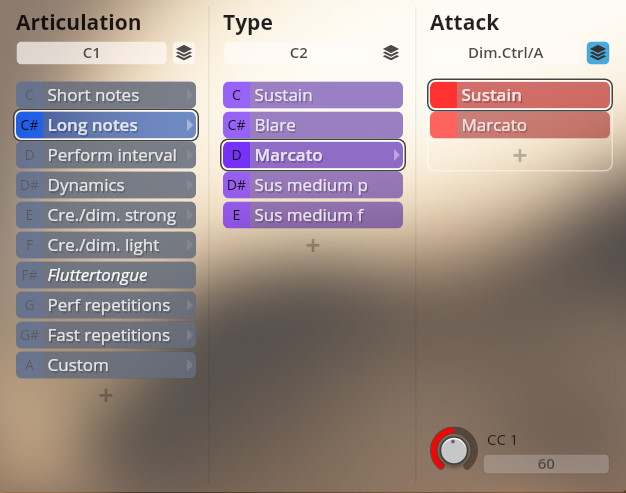
Performance legato normal and fast, as well as performance glissando. Use keyswitches to select type.
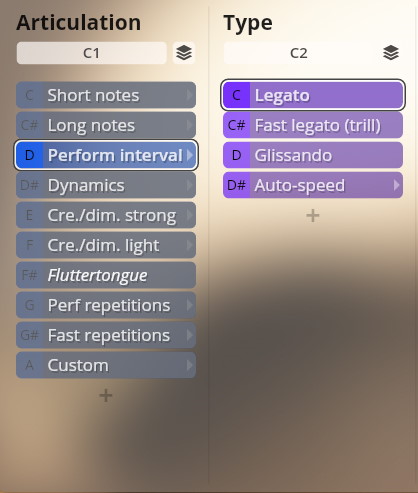
Auto-speed
The Auto-speed option switches automatically between normal and fast legato according to playing speed.
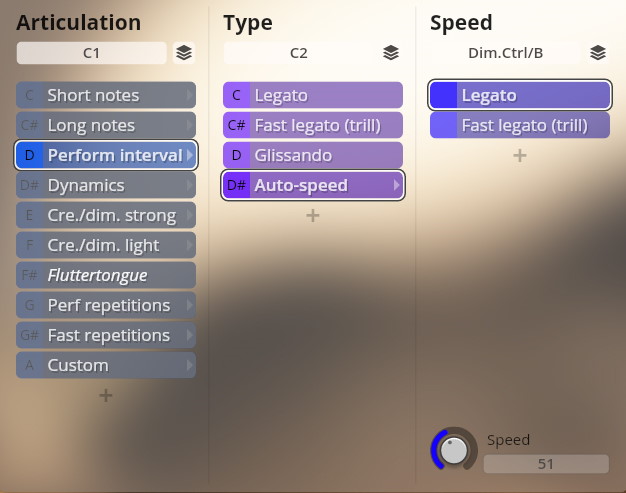
Fortepiano, sforzato, and sforzatissimo. There are no further options to these articulation types.
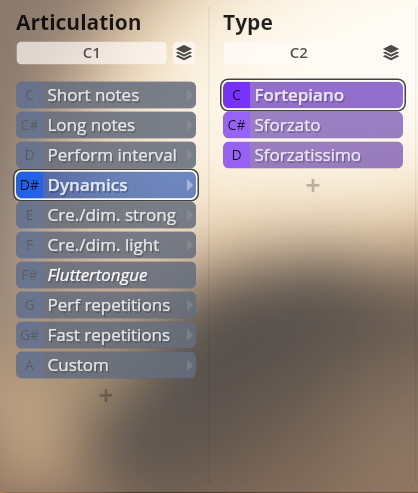
Use keyswitches to change length and to switch between crescendo and diminuendo.
Cre./dim. strong
Lengths: 1.5/2/3/4 sec.
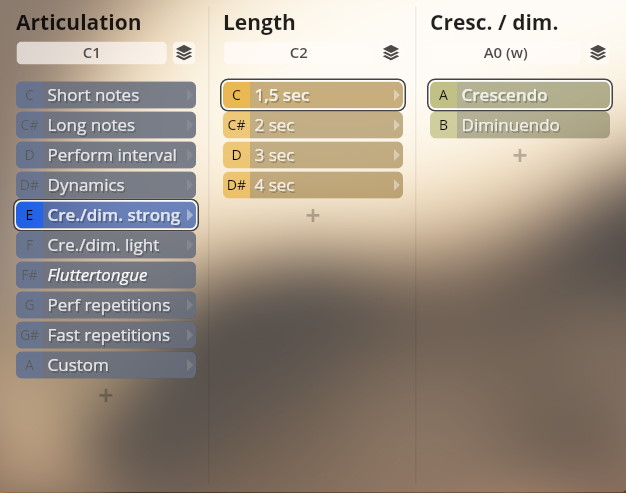
Cre./dim. light
Lengths: 1/2/3 sec.
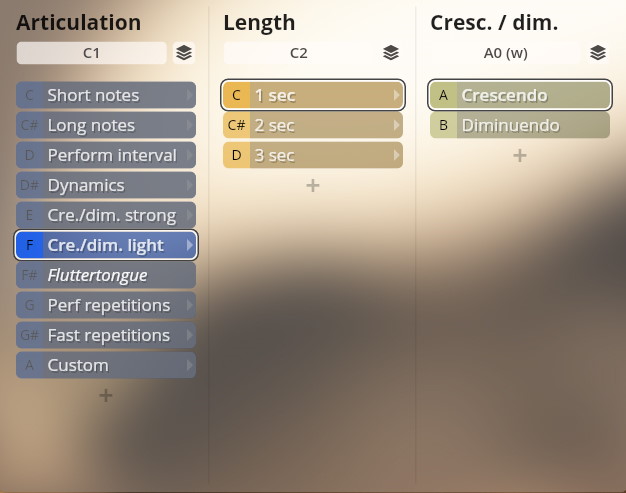
There are no further options for this articulation.
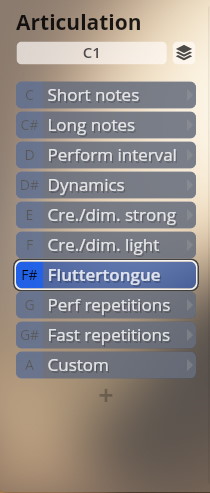
Staccato, portato, and legato repetitions, normal and crescendo. Use keyswitches to change articulation type.
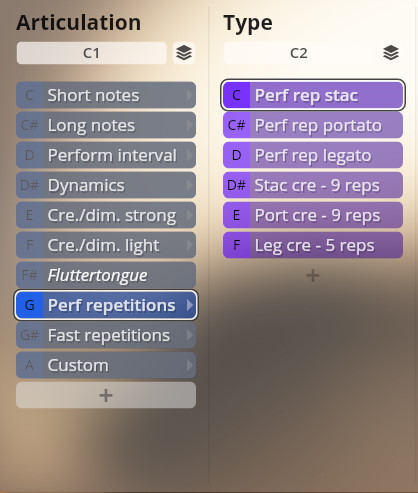
Fast staccato repetitions, 16ths at 140/150/160/170/180/200 BPM. Use keyswitches to change repetition speed.
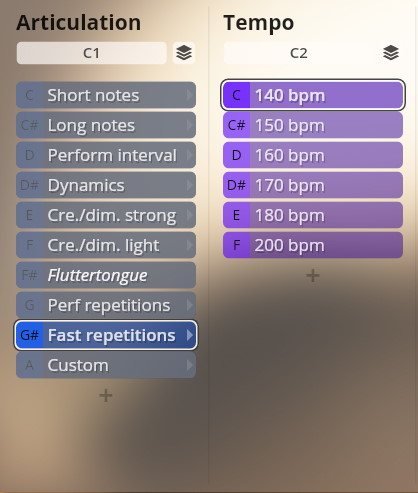
This Articulation does not yet contain any samples. It provides 6 slots ready for you to configure presets of your own, using the available Patches.
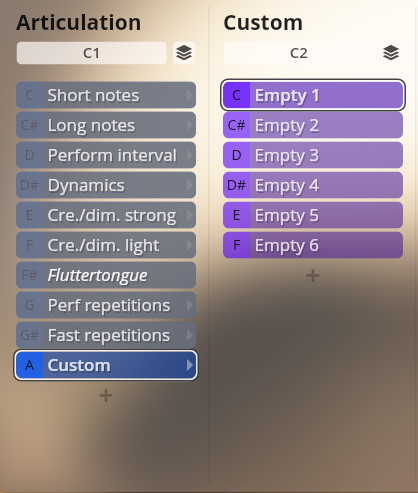
As the Low Brass instruments have a limited range of articulations compared with the other ensembles, the Preset is adapted accordingly.
There are two different mappings for each of the Low Brass Presets, so that you can use them more efficiently depending on context.
The "normal" Presets have all four players mapped in the same keyboard range. However, players 3 and 4 (bass trombone and tuba) sound an octave lower.
The Presets with "loco" in their name have players 3 and 4 mapped as they sound, i.e., an octave lower than the two trombones (except the "All Players" slot where this would make little sense).
Staccato. There is no further option this articulation.
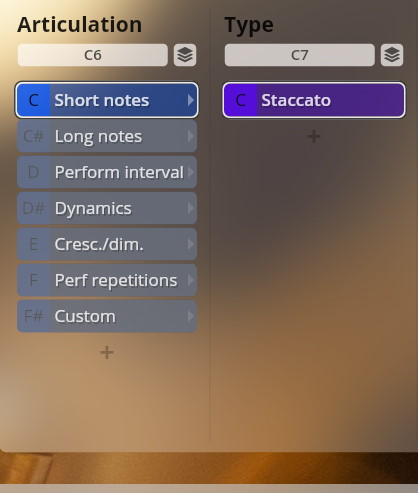
Sustained notes, normal and with marcato attack option.
Sustain
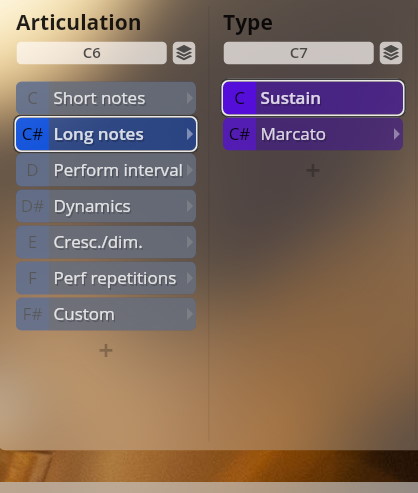
As above, but with the option to use Dim.Ctrl/A (CC1) to add marcato attacks to the notes.
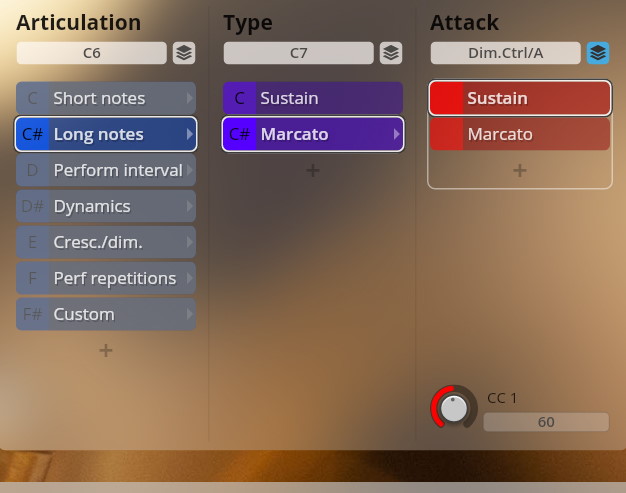
Performance legato normal and fast. Use keyswitches to select type.
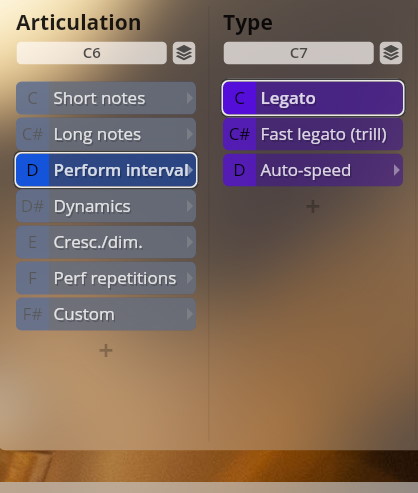
Auto-speed
The Auto-speed option switches automatically between normal and fast legato according to playing speed.
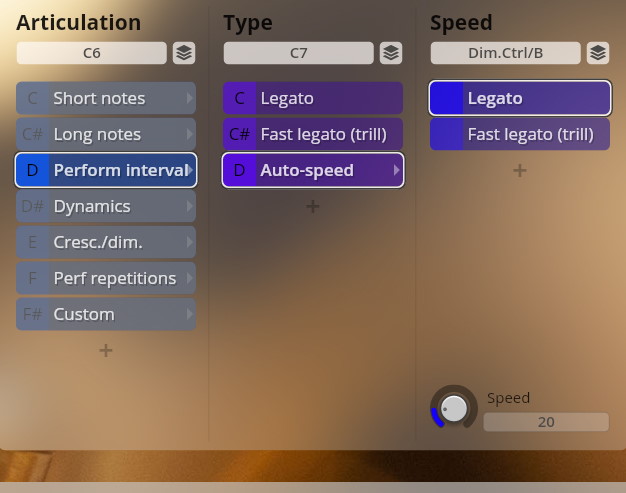
Fortepiano and sforzato. There are no further options to these articulations.
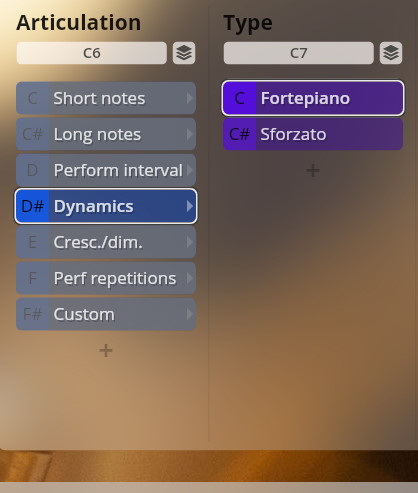
Use keyswitches to change length and to switch between crescendo and diminuendo.
Lengths: 2 and 3 sec.
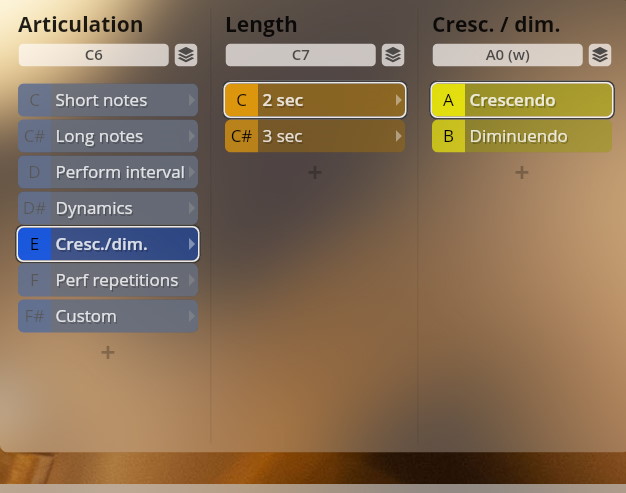
Staccato and portato repetitions. There are no further options to these articulations.
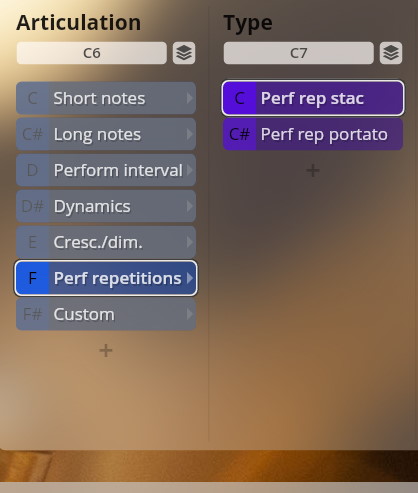
The Presets of Dimension Brass II in general are built up analogous to those of Dimension Brass I (see above), but there are a few differences in the available articulations.
By default the keyswitches for Articulations are mapped from C1 to A1 (for Middle C = C4) for the trumpets, and C6 to A6 for all other instruments. For the available Types, the keyswitches start at C2 for trumpets, and at C7 for all others.
Additional options within Articulations or Types are offered by the Dimension Controllers. The controller function is indicated by the respective caption, as of course it may take on different tasks as needed. In this Collection, the only Dimension Controllers are MIDI CC1 for the long notes' marcato option, and keyswitches for the crescendo and diminuendo Patches.
Staccato, portato, and long portato. There are no further options to these articulation types.
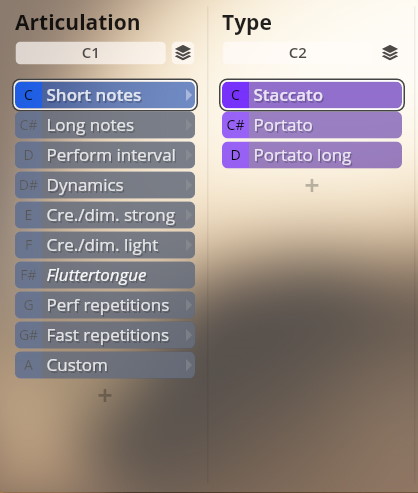
Sustained notes, normal, marcato, and medium piano and forte. The latter are unlooped medium sustains with a dynamic range from pp-mf and mf-ff, respectively.
The second slot contains a copy of the sustains to make up for the "blared" articulations of Dimension Brass I.
- Normal
- Sus medium p
- Sus medium f
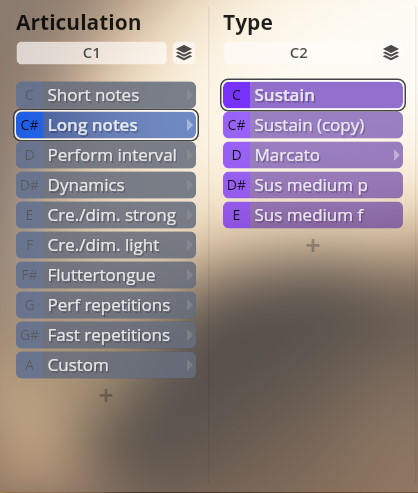
Marcato
As above with normal sustains, but with the option to use Dim.Ctrl/A (CC1) to add marcato attacks to the notes.
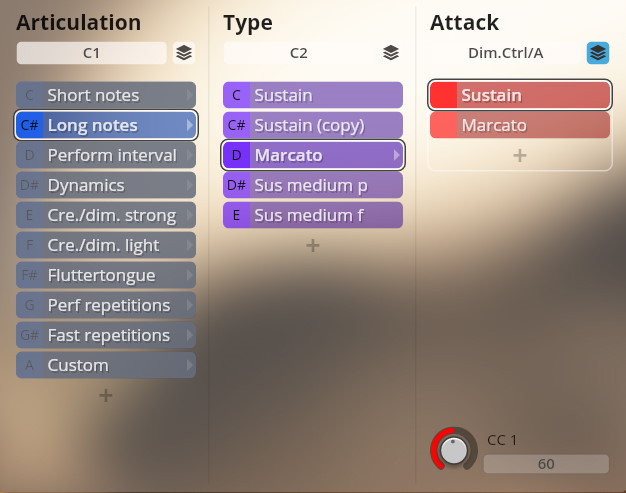
Performance legato normal and fast, as well as glissando performances. Use keyswitches to select type.
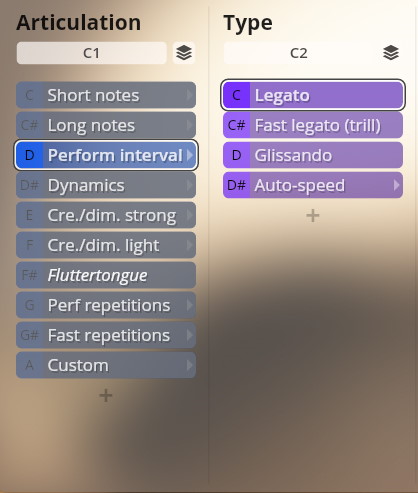
Auto-speed
The Auto-speed option switches automatically between normal and fast legato according to playing speed.
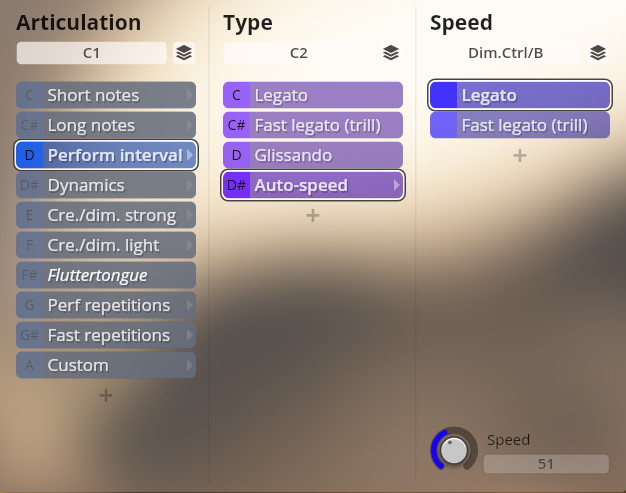
Fortepiano, sforzato, and sforzatissimo. There are no further options to these articulation types.
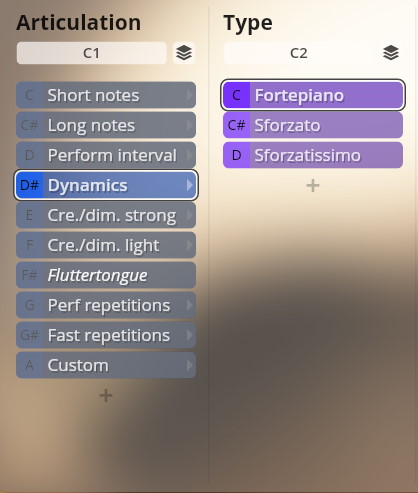
Use keyswitches to change length and to switch between crescendo and diminuendo.
Cre./dim. strong
Lengths: 2/3/4 sec.
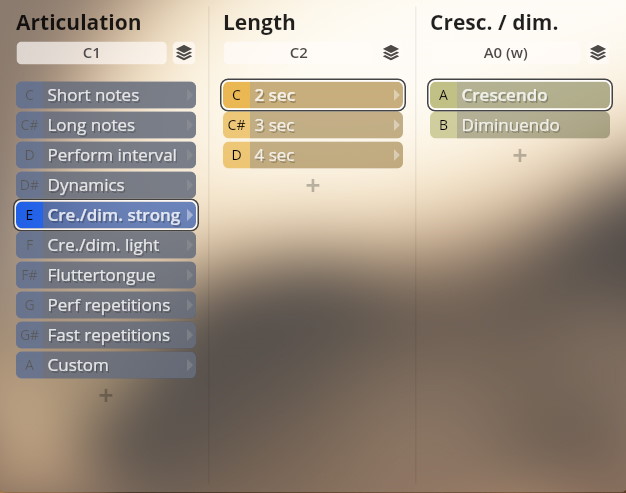
Cre./dim. light
Lengths: 1/2/3 sec.
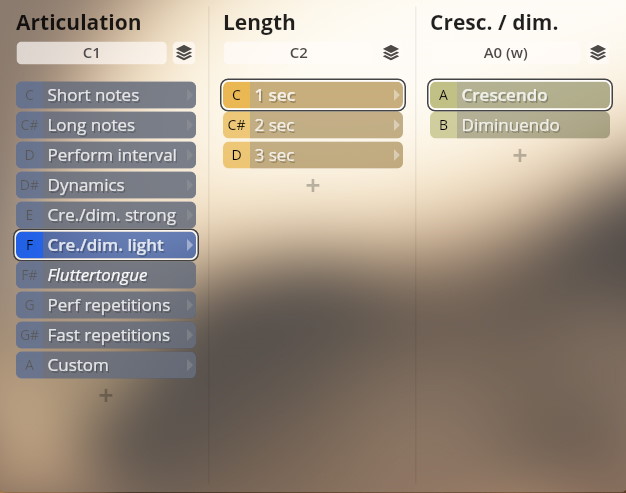
Flutter tonguing, normal and crescendo. Use keyswitches to change articulation type.
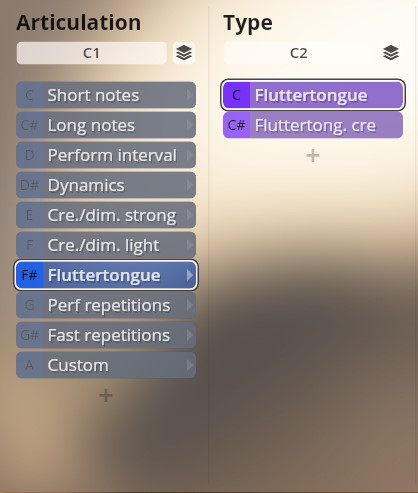
Staccato, portato, and legato repetitions, normal and crescendo. Use keyswitches to change articulation type.
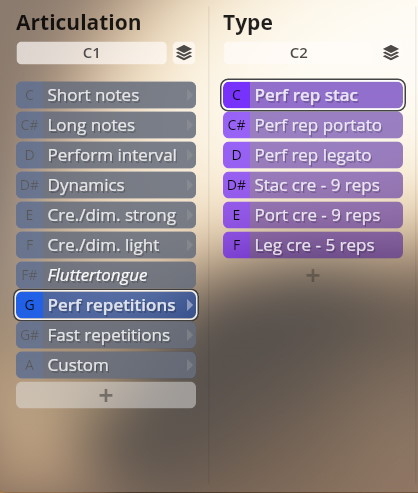
Fast staccato repetitions, 16ths at 140/150/160/170/180/200 BPM. Use keyswitches to change repetition speed.
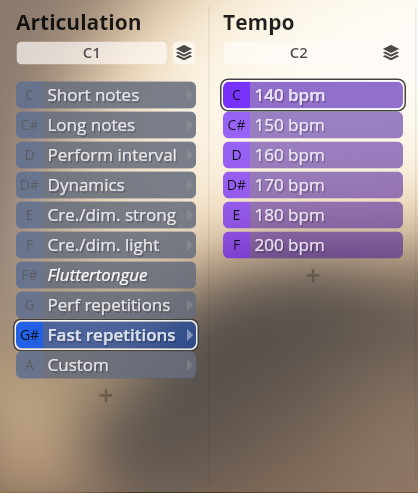
As the Wagner Tubas have a different range of articulations compared with the other ensembles, the Preset is adapted accordingly.
Staccato and portato. Use keyswitches to change articulation type.
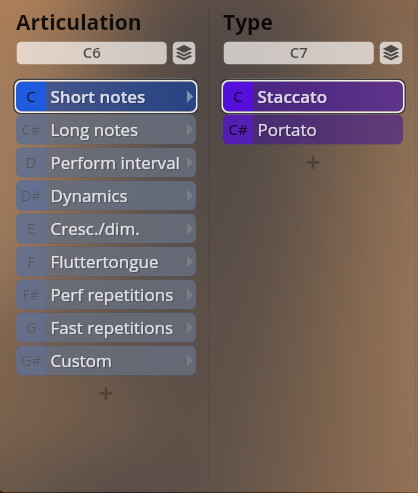
Sustained notes, normal, blared, and with marcato attack option.
Sustain, Blare
There are no further options to these articulation types.
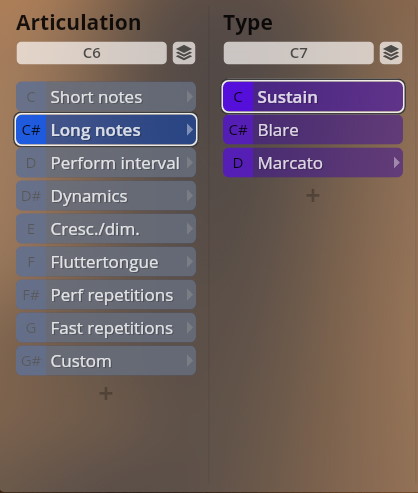
Marcato
As above with normal sustains, but with the option to use Dim.Ctrl/A (CC1) to add marcato attacks to the notes.
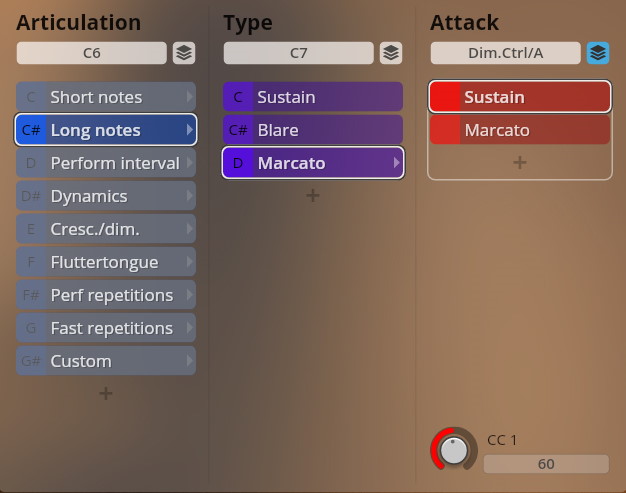
Performance legato normal and blared, with normal speed and fast. Use keyswitches to select type.
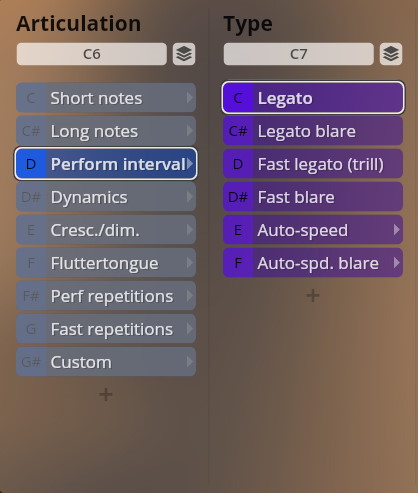
Auto-speed, Auto-spd. blare
The Auto-speed option switches automatically between normal and fast articulations according to playing speed.
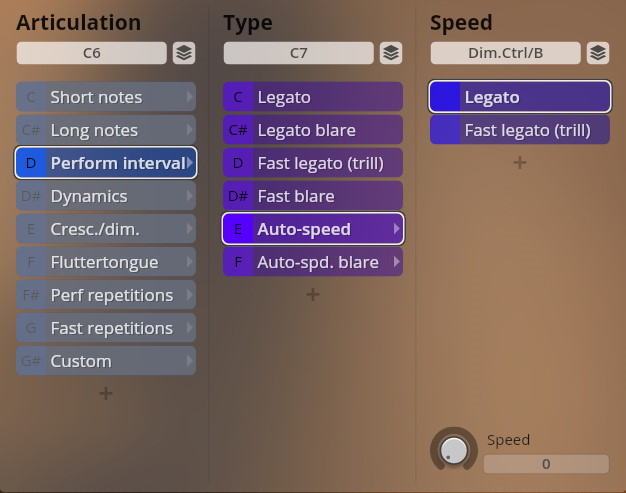
Fortepiano, sforzato, and sforzatissimo. There are no further options to these articulations.
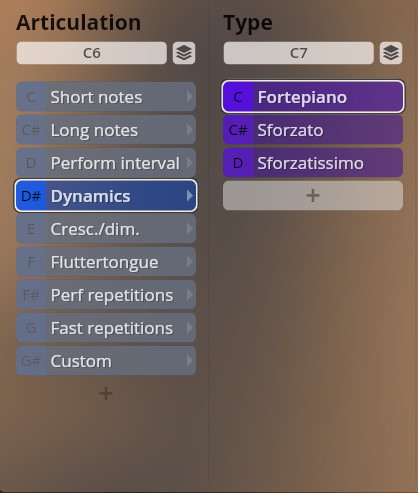
Use keyswitches to change length and to switch between crescendo and diminuendo.
Lengths: 2/3/4 sec.
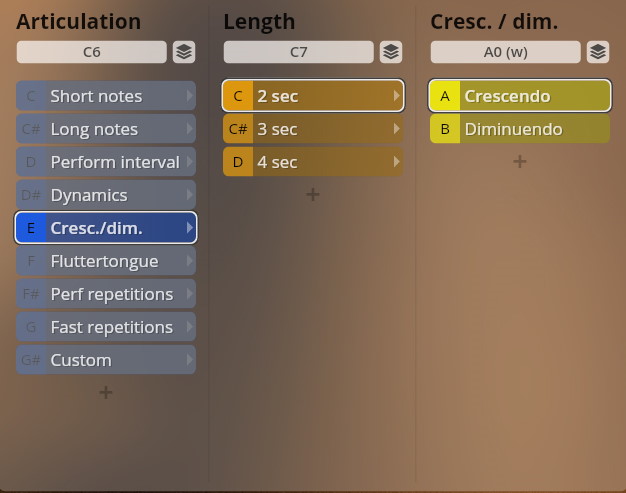
Flutter tonguing, normal and crescendo. Use keyswitches to change articulation type.
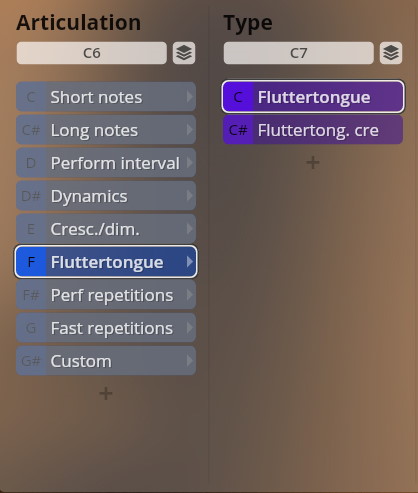
Staccato, portato, and legato repetitions, normal and crescendo. There are no further options to these articulations.
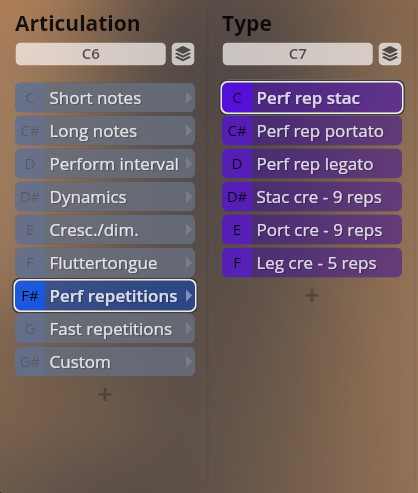
Fast staccato repetitions, 16ths at 140/150/160/170/180/200 BPM. Use keyswitches to change repetition speed.
